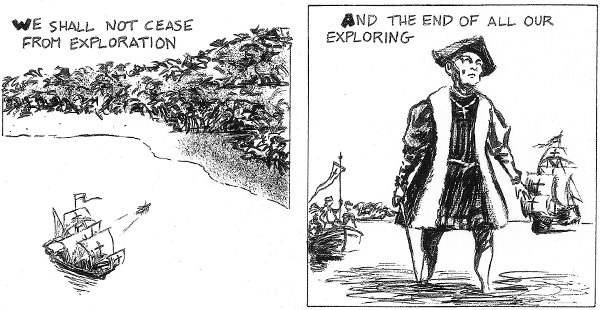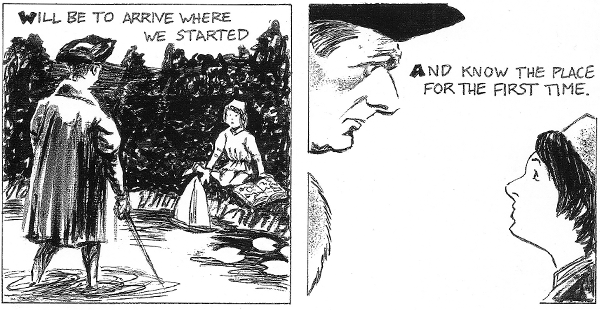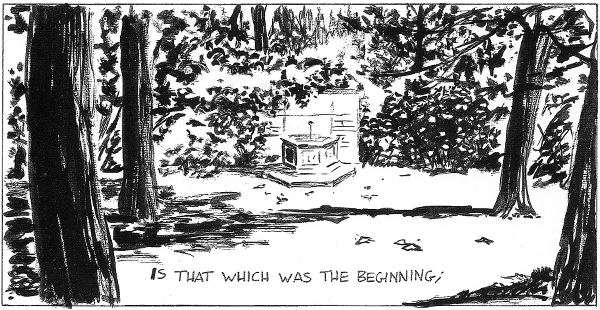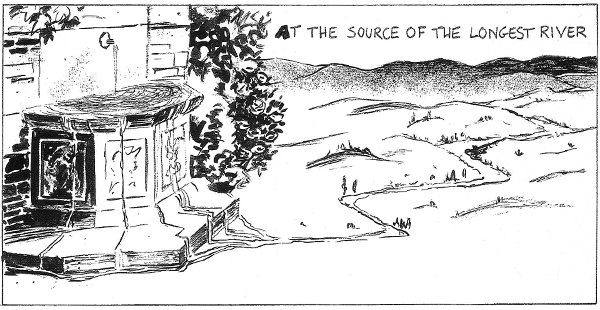Subtotal: $
Checkout-

The Need of Refugees
-

Listening to Silence
-

Editors’ Picks Issue 12
-

The Happy Nuns
-

Traudl Wallbrecher
-

The Man Who Welcomed Immigrants
-

The Soil of Friendship
-

Thomas Müntzer
-

A Time for Courage
-

“What is Truth?”
-

Readers Respond Issue 12
-

At the March For Life
-

Why the Death Penalty Must Die
-

God’s Cop
-

The Teacher Who Never Spoke
-

Bonhoeffer in China
-

The Comandante and the King
-

Confronted by Dorothy
-

Insights on Courage
-

The Art of Courage
-

Why We Hope
-

Harlem Postcards

Next Article:
Explore Other Articles:
Published in September 1942 as the final poem of T. S. Eliot’s Four Quartets, “Little Gidding” was completed after the poet survived the bombing of London in the Blitz. In this poetry comic by Julian Peters, which illustrates the poem’s final stanzas, images of aerial combat and burning churches reference these air raids.
Inspired by a visit to Little Gidding, the site of an Anglican religious community established by Nicholas Ferrar in 1625, Eliot’s poem portrays the choice he saw facing humanity: to be destroyed in the fires of war or to allow that fire to purify and restore – through God’s mercy and the fire of the Holy Spirit.
The dove descending breaks the air
With flame of incandescent terror
Of which the tongues declare
The one discharge from sin and error.
The only hope, or else despair
Lies in the choice of pyre or pyre—
To be redeemed from fire by fire.
Who then devised the torment? Love.
Love is the unfamiliar Name
Behind the hands that wove
The intolerable shirt of flame
Which human power cannot remove.
We only live, only suspire
Consumed by either fire or fire.
What drew Eliot to Little Gidding? Three centuries earlier, after a catastrophic crash of the Ferrar family’s mercantile empire, about forty men, women, and children of the extended family left behind a worldly life to devote themselves to godly living, constructive work, and a daily rhythm of Bible study and prayer. The community ran a school, provided lodging for several needy elderly women, and dispensed soup and medicine to the local people.
Even the defeated King Charles I, a family friend, sought refuge at Little Gidding during the English Civil War. (The community found him safer lodgings nearby.) With England once more at war, Eliot wrote, “I think, again, of this place, / And of people, not wholly commendable / …/ United in the strife which divided them.” Though the community faltered after the death of its founders, perhaps something had been won for all time in that place, which continues to attract pilgrims to this day. It is to them Eliot writes:
You are not here to verify,
Instruct yourself, or inform curiosity
Or carry report. You are here to kneel
Where prayer has been valid.
Are we willing to be purged by the suffering of our age? If so, the poem offers words of assurance borrowed from the fourteenth-century mystic Julian of Norwich: “All shall be well, and / All manner of thing shall be well.” —The Editors












Already a subscriber? Sign in
Try 3 months of unlimited access. Start your FREE TRIAL today. Cancel anytime.
































